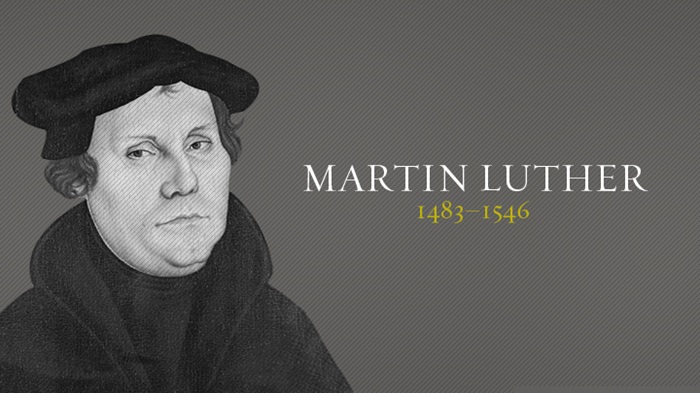“Here I stand. I can do no other.”
So said Martin Luther. At the time he was on trial by the Holy Roman Church for writing heresy. It was 1521. On that day he refused to deny his arguments against indulgences. And he was soon excommunicated – barred for life – from the church.
What were indulgences and why was Martin Luther standing against them?
Martin Luther was a German Catholic, a vowed Franciscan friar, a professor, a preacher, and a servant of the church when this began…
Long before his heresy trial, in 1517 (500 years ago) on All Saint’s Eve (Halloween) on the door of All Saints’ Church he posted his now infamous 95 theses. For the next four years Luther wrote, argued, and preached against the church’s practice called “indulgences.” Indulgences were part of a complex system of exchanges in the church. In the “economy of salvation” that guided everyone’s thinking during the time period, when a person sinned – lying, theft, adultery, and other moral acts named in scripture – they risked spending time after death in a shadowy middle ground between heaven and earth called purgatory – rather than going directly into God’s presence. In order to avoid purgatory people needed to do acts of mercy at the direction of their priest. People could also perform acts of mercy for loved ones who had already died and might be stuck in purgatory themselves.
But what if there was a way to avoid purgatory altogether? What if there was a way to speed up the process? Enter indulgences: these were payments to the church. They allowed people to gain freedom from God’s punishment for sin. The money collected from indulgences went to fund various building campaigns in the Holy Roman Empire, including the building of St. Peter’s Basilica in Rome.
Thus rather than actual repentance (accepting the feelings of guilt and responsibility for the sin) or restitution (repaying the damages) for one’s wrongdoing, one could instead pay the church and be released from responsibility… Wealthy and privileged people were especially interested in using this system, yet even poor people traded their money for release from purgatory. . . See why Luther was not loving this?
Is there any parallel in our world 500 years later?
What is the current “economy of salvation” in the church? Salvation is all about grace now – thanks in large part to the theology of Luther. So if we can’t buy salvation… And there is little or no place for purgatory in Protestant thinking 500 years later… What is it we are buying?
There are three possible things I wonder about…
Looking around it seems we are buying everything we can get our hands on… Is there salvation in our stuff? I’m pretty sure most days I’m hindered in knowing where to stand because I am so surrounded by things, there is little space for my well-shod feet to even touch the ground…
Or maybe it is possible that I use my privilege and wealth to buy more insulation – keeping me away from others? How do my accumulations and achievements depend on the suffering or harm of others? When I insulate myself from seeing my privilege, then I also risk seeing how this condition not merely my own doing, but I am caught up in a system of injustice, and I must ask how that system benefits some and harms others.
Or maybe what I’m buying is a story about myself? Perhaps it is a story steeped in denial that lets me believe everything is fine, or nothing really needs my attention. Or if something does need attention, I’m just one person. What can I really do? (This is a weasel’s way out! But I hear this line of thinking often.)
I think it is important that we find space – preferably in our faith communities – to say to each other “here I stand” and to make confessions to one another by answering these questions:
- How are the present “economies of salvation” shaping my life?
- How may they be harming those who are poor?
- How may they be harming my own soul?
Martin Luther found himself barred from the church he dearly loved and wanted to change. But that did not stop him from going right on with making church as best he could. In his deep commitment to God and the people, a new church was born and continues to grow and bear fruit. Lutherans, yes, but also a much wider swath of Protestant Christians. The schism in the church also left a deep rift that even amid many efforts to heal, remains fraught with misunderstanding, conflict, and a profound need for healing. Perhaps one of the biggest question that remains is what is in the economy of salvation for the church itself and how shall it be saved?
In Martin Luther’s words… by grace alone.




